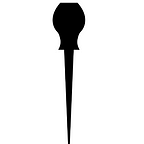by Peter Wieben
My friend Will makes industrial machines. A while ago, he moved to India to start a company. While driving one day, he had a stroke, and lost control of his vehicle. After being let out of the hospital, he emailed me and said that he wanted to show me the future of industrial civilization. A few months later, I flew from Cairo to Ahmedabad.
Scans of Will’s brain, following stroke.
A little while into our journey, we decided to sneak into a shipyard at Alang. It’s a graveyard for ships — around half of all ships are sent there to die — where giant boats are torn apart with basic tools. We were told that it was usually not legal for anyone to go there who is not interested in buying scrap metal; too many foreigners had ventured there with the intention of exposing its labor and environmental practices. In order to get in, Will told someone that he was interested in buying scrap metal, and due to his machine-building background, he was very convincing.
The drive to Alang from Ahmedabad was very long. When you arrive, you drive through a huge flea market that sells anything that has been taken out of the ships. The ships are sold whole, so even the family photos of the sailors are sold off afterwards. There were warehouses full of lifejackets, treadmills, and blenders.
A man flies off the back of a potato truck and loses his shoes; a sick man is lying in the shade of an engine that was taken from a giant ship.
The shipyard smelled like a chemical fire. There were men crawling on piles of sharp metal, and machines tearing large pieces of metal apart. Everywhere we looked, men were engaged in Sisyphean tasks, surrounded by sparks and smoke. The ships went on for kilometers, one ship after the next; they were all so enormous that the little men on them look like fleas. While driving up and down the rows of ships, a dog attacked our car. It looked like it had been dipped in oil.
We asked a yard boss how many people die every year. He shrugged and said “four or five.” There were open fires burning insulation, and men climbing up through the guts of the ships. Most of the deaths, we assumed, were industrial accidents. Falling, crushing, burning. Others, due to inhalation, took longer and happened beyond the borders of the shipyard.
At the edge of the shipyards were open sewers and muddy workers’ quarters. The shacks were made of corrugated steel, and fifteen workers could stay in each one. All over Alang, there were hand-painted signs that said things like SAFETY IS OUR MOTTO or CLEAN ALANG GREEN ALANG.
The coastline at Alang, covered with oil, metal, feces, trash, shoes.
After leaving the shipyard, Will said he had another idea: Back in Ahmedabad, at the edge of the city, he said there was a mountain made entirely of trash. We left Alang, and went to look for it.
On the way, we kept getting sidetracked, looking into machine shops and pulling over to watch festivals. We went to a giant warehouse that is home to a five-axis CNC lathe, a very powerful machine capable of making machine parts; Will called it a “mother machine.” This is a gear that is part of a machine that digs down into the earth to mine materials used to make more machines.
A painting outside a small machine shop in Ahmedabad.
We found a large number of statues. These represent Lord Ganesha, Remover of Obstacles. (Will is in the middle, for scale.)
People walk up the stairs of a temple and float away forever; an abandoned letter.
We went to a festival for holi and saw a machine that could single-handedly make music for weddings. Included in the machine were drums, horns, xylophones and many gears.
Street sweeper.
Ahmedabad, Gujarat, India.
I became obsessed with abandoned shoes. I saw them sitting everywhere. I took pictures every time I saw an abandoned shoe. The area we were in was very chaotic, and people were moving machines around and making a lot of noise, so I tried to concentrate on the abandoned shoes.
Near the end of the journey, we found what we were looking for, a looming shadow in one of the industrial districts of Ahmedabad. The mountain seemed to be ten stories high. Trucks constantly dump new trash into the pile, which smolders twenty-four hours a day. There are families that live on top of the pile in huts made of trash. All of the children were wearing mismatched shoes; on top of the mountain there were many, many abandoned shoes.
Will claimed that this could all be done in a way that was safe and clean, using robots. It would be efficient, cheap, free from suffering. In the end, he said, industrial civilization always only wanted more machines.
